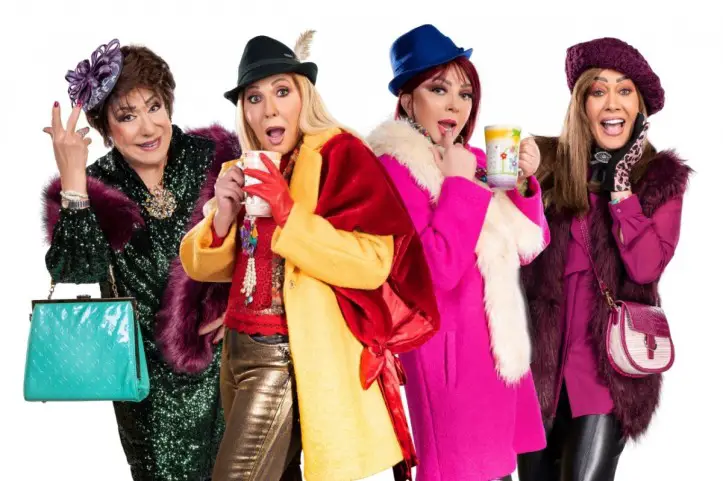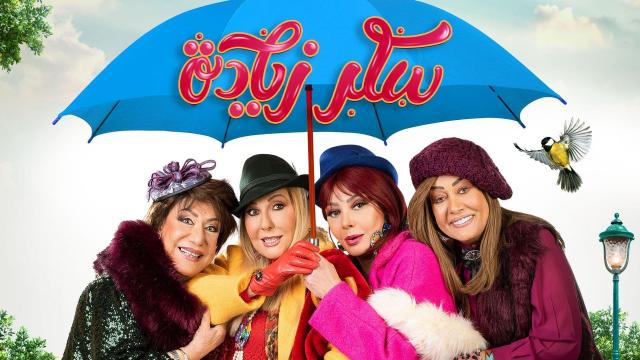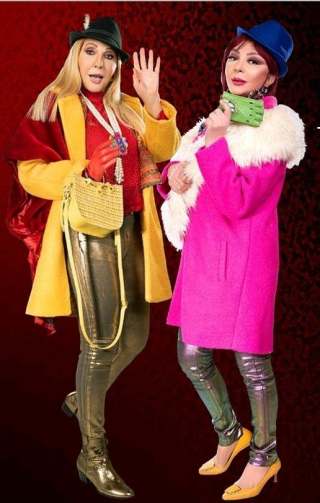Friday May 22, 2020 By: Alexandra Kinias

Misogynistic cultures shape women in social molds. In these societies women are labeled and shamed if they deviate from the standard expectation dictated to them. Young girls are perpetually bullied if their hair texture, skin color or weight don’t conform with the convention beauty standards. Single women and divorcees, are stigmatized. Menopause in these cultures is labeled, “The age of despair”. In addition, these societies created unwritten life manuals, traditions, to dictate to women how to live their lives. In these manuals, fun is an explicit prerogative trait of the young. The derogatory and critical comments the four Egyptian actresses, Nabila Ebeid, Nadia El Guindy, Samiha Ayoub and Hala Fakher, received for their roles in the show “Sokar Zeyada” (Extra Sweet) reinforces that social stigma is a progressive social illness in Egypt.

With a career that spanned over five decades, and though many may not favor some of their roles, these actresses have left their fingerprints in the entertainment business. Nonetheless, Sokar Zeyada, a cheap adaptation of the American show “Golden Girls”, had no depth. With mediocre performance and withered beauty, the actresses, in their seventies, played roles of women beyond their prime years; passed the age of despair. The show bombed. The actresses were humiliated, labeled and insulted. The negative criticism they received was not for their performance, though, but for breaking out of the traditional mold. Their age signed the death certificate of the show even before it aired.
Viewers were intimidated by the actresses within the scope of the roles they played. The viewers’ attitudes and comments displayed bullying, social intolerance and negative connotations for their age group. In their minds, the actresses committed the sin/crime of having fun and enjoying life at an age where women, according to traditions, should be bedridden, discussing ailments and health issues, not fashion and hairdos. The hype over Sokar Zeyada before it started exposed the stigma of aging in Egypt.

Behind closed doors, away from the prying eyes of families and society, elderly women break social expectations. They laugh out loud, sing, dance, and tell shocking dirty jokes. In brief, they have fun. Women are left alone as long as their behaviors are confined in their quarters, a tradition passed down from the days of the harem. However, when women display their fun is public, they are bullied, ridiculed and shamed, to retreat back behind closed doors. Those who lose their social compass and persist to stay in the public sphere are portrayed as wasted souls suffering from old age mental issues. Some might pity them for losing their minds.
Misogynistic societies don’t want young girls to follow in the footsteps of these older women. Girls laughter sound delightful when they are young. But as they get older, social norms constrains them, forces them to stop laughing. Laughter is not a respectable girl’s trait. A loud laugh is a sign of promiscuity. Promiscuity shatters family honors. To save girls from the influence of fun loving women, to protect their honors, we shame these women to push them back to their holes.

Sokar Zeyada exposed the non-convention side of elderly women’s lives from a perspective that defies traditions. The behavior and attitudes of the four women shocked the viewers more than their appearance. They strayed from the social expectations, didn’t fit the mold of women their age. “Live your age,” they criticized them; which translates to, “play the stereotypical roles of women your age.” No one criticizes actresses playing roles of sick and ailing women, women working in minimal manual jobs, struggling to make ends meet, supporting their families and sick husbands. Pious widows resisting temptations and sacrificing a second chance in life for the happiness of their children are worshiped on pedestals and worshiped. These are all the perfect role models for young girls because in these cultures there is no tolerance for those who attempt to rewire the fraying mentalities.

Societies worldwide have tangible repercussions on how aging women are viewed and treated. In misogynistic cultures, in particular, women are still judged by their beauty and youth. Their beauty is their ticket to social acceptance and a fine marriage. It opens doors and opportunities for them. In these cultures, women intellect, professional or academic success come second. As they reach menopause, disgracefully labeled by age of despair, and their beauty wilts, society discard them as irrelevant. They are pushed to the edge of life.
Beyond face wrinkles, sagging bodies, limitations to mobility, sleep deprivation, anxiety, depression, hormonal hot flashes, night sweats, weight gain and other symptoms of menopause, there is also a beating heart that never ages. Menopause is not shameful. It doesn’t make women invalid or invisible. It doesn’t decrease their value or worth either. It’s just a new phase in women’s lives that should not only be accepted by society, but also honored. It’s a certificate of merit for women’s life accomplishments, personal and professional. It’s an award for their contributions to their societies and the world.

Thus, despite the cultural constraints, women have to discard the social cloaks that have shrouded them for generations. They have to speak loud, be seen and make their voices heard, at any age. After a long life of hard work, after fulfilling everyone else needs, women have the right to enjoy life and have fun, fulfill their unfinished dreams, pursue their passions and grow in different dimensions. They can accomplish that with gray or colored hair, with wrinkles or facelifts. There is no shame to want to lose weight, strive to look their best, workout to maintain their shape, or use medical interventions to improve their looks. There is no shame to do none of that either. Women choices and decisions are not social referendums.
Perhaps Sokar Zeyada didn’t rise to the actresses’ long history on the silver screen or on stage, but it shed light on an existing issue that had been swept under the carpet for too long. Hopefully, its concept had paved the path for more courageous actresses to perform in shows that break the traditional stereotypes of this age group, and take more bullets for us all. The more woman stand up and request social change, they will bring change. They don’t just owe it to themselves, but to the younger generations too.
Photo credites MBC Masr
***If you liked this article, don’t forget to subscribe to our newsletter and receive our articles by email.
